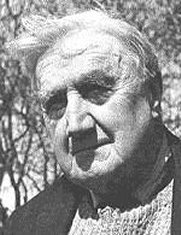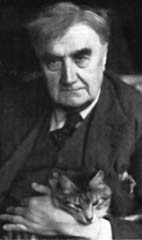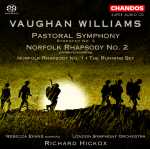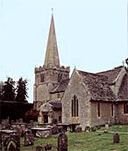|
The Lark Ascending Still

Ralph Vaughan Williams was born in Down
Ampney, Gloucestershire, on the 12 October 1872. He studied with Parry,
Wood and Stanford at the RCM and Cambridge, then had further lessons with Bruch in Berlin (1897) and Maurice Ravel in
Paris (1908). It was only after this that he began to write with sureness in larger forms, even though some songs had had
success in the early years of the century. That success, and the ensuring maturity, depended very much on his work with folksong,
which he had begun to collect in 1903; this opened the way to the lyrical freshness of the Housman cycle On Wenlock Edge and
to the modally inflected tonality of the symphonic cycle that began with A Sea Symphony. But he learnt the same lessons in
studying earlier English music in his task as editor of the English Hymnal (1906) - work which bore fruit in his Fantasia
on a Theme by Tallis for strings, whose majestic unrelated consonances provided a new sound and a new way into large-scale
form. The sound, with its sense of natural objects seen in a transfigured light, placed Vaughan Williams in a powerfully English
visionary tradition, and made very plausible his association of his music with Blake (in the ballet Job) and Bunyan (in the
opera The Pilgrim's Progress). Menwhile the new command of form made possible a first orchestral symphony,
A London Symphony, where characterful detail is worked into the scheme. A first
opera, Hugh the Drover, made direct use of folksongs, which Vaughan Williams normally did not do in his orchestral works.
His study of folksong, however, certainly facilitated the pastoral tone of The
Lark Ascending, for violin and orchestra, and then of the Pastoral Symphony. At the beginning of the 1920s there followed
a group of religious works continuing the visionary manner: the unaccompanied Mass in g Minor, the Revelation oratorio Sancta
civitas and the 'pastoral episode' The Shepherds of the Delectable Mountains, later incorporated in The Pilgrim's Progress.
But if the glowing serenity of pastoral and vision were to remain central during the decades of work on that magnum opus,
works of the later 1920s show a widening of scope, towards the comedy of the operas Sir John in Love (after The Merry Wives
of Windsor) and The Poisoned Kiss, and towards the angularity of Satan's music in Job and of the Fourth Symphony. The quite
different Fifth Symphony has more connection with The Pilgrim's Progress, and was the central work of a period that also included
the cantata Dona nobis pacem, the opulent Serenade to Music for 16 singers and orchestra, and the a Minor string quartet,
the finest of Vaughan Williams's rather few chamber works.
A final period opened with the desolate, pessimistic Sixth Symphony, after which
Vaughan Williams found a focus in the natural world for such bleakness when he was asked to write the music for the film Scott of the Antarctic: out of that world came his Seventh Symphony, the Sinfonia Antarctica, whose pitched
percussion coloring he used more ebulliently in the Eighth Symphony, the Ninth returning to the contemplative world of
The Pilgrim's Progress.
Vaughan Williams died in London on 26 August 1958.

|
| RVW pictured in 1942 with Foxy. |
|
 |
|
|
 |
 |
 |
|

from someone named
agentsmith
thanks agentsmith!
hear RVW talking about
the English Hymnal that
he was asked to edit in 1904
cyber hymnal profile
an essay on the writing
of the music for this film
it was RVW's first film score

RWV Related Links
the area of England that inspired
RVW
RVW's master film score
founded in 1905 by
Margaret Vaughan Williams,
sister of RWV.
RWV was the festival conductor
till 1953
RVW was long associated
with this wonderful
music festival
|
|
 |
 |
 |
|
|
|

